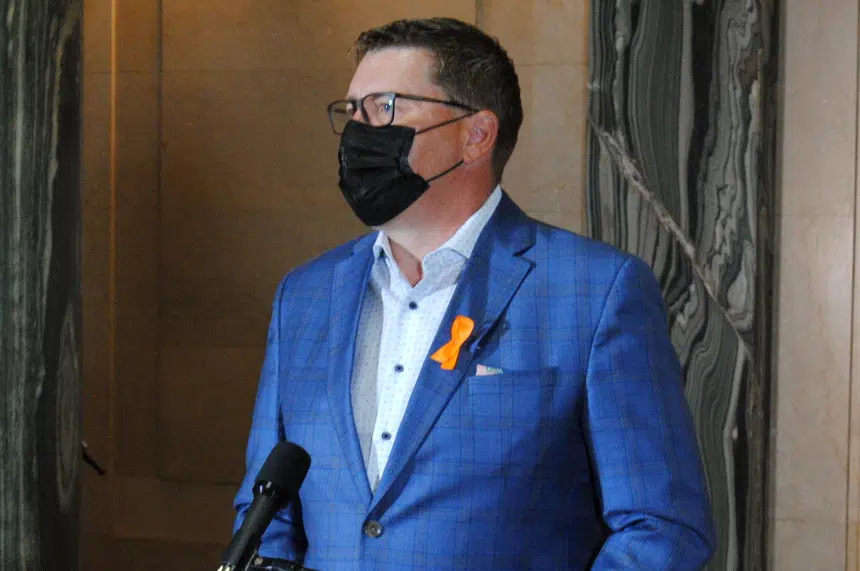The Saskatchewan government is joining the Federation of Sovereign Indigenous Nations (FSIN) in calling for radar ground searches of residential school sites in the province.
After the remains of 215 children were found on the site of a former Indian Residential School in Kamloops, the FSIN called on governments to start looking into undocumented deaths and burials on the sites of similar institutions in Saskatchewan.
That included radar ground searches at the sites of the Muskowekwan Indian Residential School (IRS), Onion Lake St. Anthony’s IRS, Beauval IRS, Guy Hill IRS, Lebret IRS and Sturgeon Landing IRS, along with additional sites in consultation with First Nations in Saskatchewan.
“Our First Nations communities and families need closure to begin healing from the traumas forced upon them at these residential schools,” FSIN Chief Bobby Cameron said in a media release Monday.
“There are thousands of families across this country and in our Treaty territories that have been waiting for their children to come home. These children deserve the respect and dignity of proper burials and we must follow protocol and work with our Elders to ensure that their souls are at peace.”
The FSIN called on the federal Liberal, NDP and Conservative parties to support the plan.
In Saskatchewan, Premier Scott Moe said his government was fully behind the FSIN endeavour, pointing out there were an estimated 20 resident schools that operated in Saskatchewan, the last closing in the 1990s.
“The discovery of the remains of these 215 children is a haunting reminder of the horrific reality that too many Indigenous faced — a stark example of the grim legacy of residential schools in our nation,” Moe said.
“Saskatchewan is prepared to move forward with this effort in collaboration with our Indigenous community, with our Indigenous people.”
Moe joined the call for action from the federal government but said the provincial government will support the work regardless.
The support from the province could include money, people, and equipment and technology, according to Moe.
“We want to work with the FSIN so that if there is some areas, we will most certainly look into can we bring in some technology to identify if there are remains there and, most certainly, start the process of some closure for too many families, quite likely, here in this province as well,” said Moe.
Moe couldn’t give a timeline on when work on the ground might start, but did say the FSIN already has some areas identified and prioritized.
The premier stressed the provincial government will be working with and supporting the FSIN and Indigenous communities’ efforts, saying this isn’t a time for the government to lead.
“We will use whatever resources we have in government to assist, to support, and to ensure that this initiative — that, at this point in time, is being led by Chief Bobby Cameron and the FSIN — that we are there to assist, to help, to support in any way that we can to expedite this process,” explained Moe.
Moe called residential schools a large stain on Canadian history and said that history is right here in Saskatchewan. He recalled a residential school which was open into the mid-1990s in Prince Albert.
“I can remember as a child playing sports against the Indian Residential School in Prince Albert, knowing many people from Ahtahkakoop and from Big River First Nation that attended the Indian Residential School in Prince Albert,” Moe remembered.
When asked why his government is only taking steps to support this work now, Moe talked about the work the province has been doing on calls to action from the Truth and Reconciliation report and pointing out some burial sites in the province have been protected by government.
In 2019, the Battleford Industrial School Cemetery — the final resting place of at least 74 children who died while attending the institution — was designated a Provincial Heritage Property. The same designation was given in 2017 to the Regina Indian Industrial School Cemetery, where at least 36 children are buried.
Saskatchewan’s NDP is joining the call for a full search to be done in Saskatchewan.
NDP Saskatoon MLA Betty Nippi-Albright called the discovery in B.C. heartbreaking and said she couldn’t imagine that happening to her kids or grandkids.
Nippi-Albright believes the province should be taking this opportunity to do more than give lip service about support. She said it needs to “walk their talk” with concrete measures like a funding announcement.
“It’s going to be a huge undertaking to find and locate the unmarked graves that we have here in Saskatchewan,” said Nippi-Albright.
She also believes there should be a timeline for when the work will start.
“When the government wants to push its own agenda, they act fast and I know, in Saskatchewan, we are a racist province and we need to act on this,” she said.
Nippi-Albright is a residential school survivor and she said on Monday it had been an emotional and triggering day for her and other survivors.
“As Indigenous people, we’re tired of being on the back burner,” she said. “This is important for all of us because it affects every one of us. And if we want to achieve reconciliation, we have to walk our talk, we have to do something today — not next week, not next month, not next year, not in the next fiscal budget. We need to do it now.”
Flags at the Saskatchewan Legislative Building are being flown at half-mast to commemorate the children whose remains were found in Kamloops.
According to the federal government, 150,000 Indigenous children were taken from their families and put into the residential school system, which operated in Canada for more than a century.











